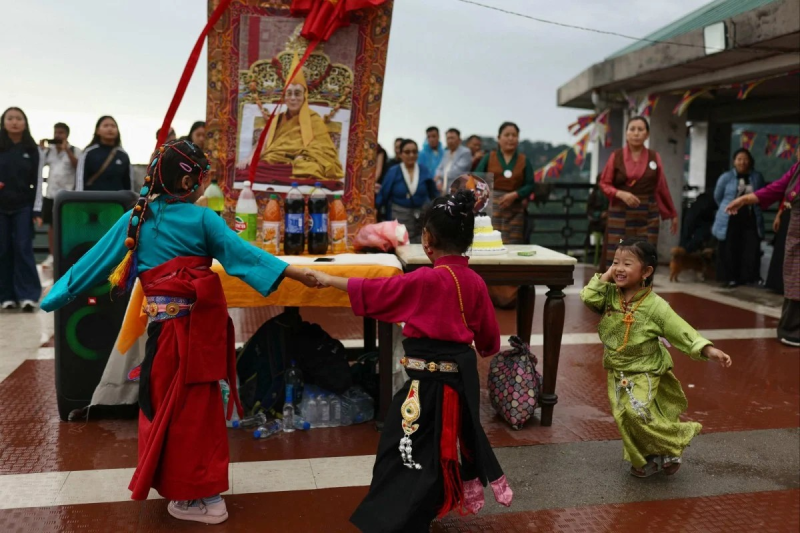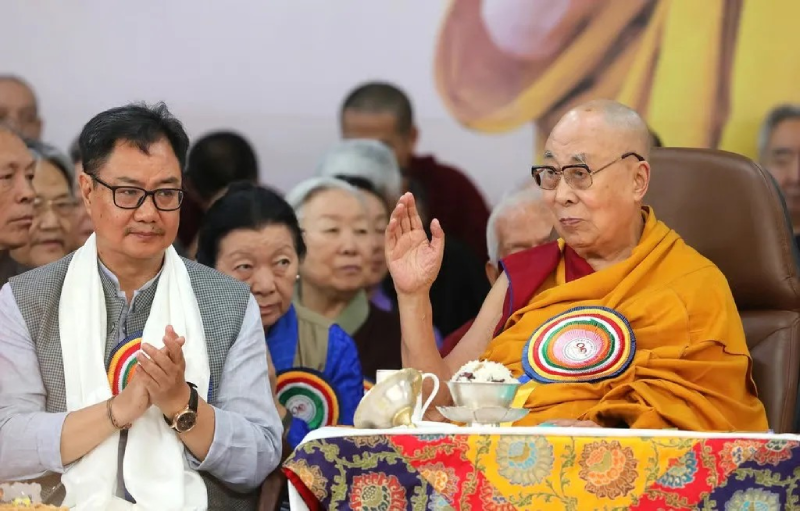Liu Zongyi Interviewed by South China Morning Post
Liu Zongyi source:South China Morning Post
source:South China Morning Post
Tibet is a red line that cannot be crossed, one observer warns, while another says ‘young and weak’ thaw will survive reincarnation dispute
The fallout between China and India over the 14th Dalai Lama’s succession plan has put a strain on their improving relations, but observers say the dispute is unlikely to completely jeopardise the thaw between the neighbours.
The dispute was triggered last week by comments from a senior Indian minister, Kiren Rijiju, who said only the Dalai Lama himself and the institution he established had the authority to identify his successor as the spiritual leader of Tibetan Buddhism.
Then on Sunday, Indian Prime Minister Narendra Modi extended 90th birthday greetings to the Dalai Lama, who lives in exile in India.
The remarks drew criticism from China twice within a week, with Beijing asserting that the Dalai Lama’s succession must adhere to tradition and Chinese law.
Senior Indian minister Kiren Rijiju attends the 90th birthday celebrations for the Dalai Lama at the Tsuglagkhang Tibetan temple complex near Dharamsala, India, on Sunday. Photo: EPA
Beijing had lodged a formal protest and urged India to stop interfering in China’s domestic affairs, the Ministry of Foreign Affairs said on July 4, a day after Rijiju’s comments. On Monday, it described the 14th Dalai Lama as a “political exile who has long engaged in anti-China separatist activities … under the cloak of religion”.
The Indian foreign ministry said New Delhi did not comment on religious matters and upheld the freedom of religion.
“The government of India does not take any position or speak on matters concerning beliefs and practices of faith and religion. The government has always upheld freedom of religion for all in India and will continue to do so,” a ministry spokesman said on July 4.
Rijiju’s remarks had come a day after the Dalai Lama said his office – the Gaden Phodrang Trust, which is headquartered in India – held the “sole authority” to recognise the next Dalai Lama.
Beijing was swift to reject the Tibetan spiritual leader’s plan, saying “the Dalai Lama’s reincarnation must follow the principles of domestic recognition … and approval by the central government, in line with religious traditions and laws”.
India has hosted the Dalai Lama and the Tibetan government-in-exile in Dharamsala since 1959, when an armed uprising in Tibet was crushed by the People’s Liberation Army. New Delhi formally recognised the Tibet autonomous region as part of China in 2003.
Liu Zongyi, director of the Centre for South Asia Studies at the Shanghai Institutes for International Studies, said the matter directly involved China’s territorial sovereignty and was a red line that could not be crossed.
“In fact, it was a crucial factor that ultimately led to the breakdown of China-India relations and the 1962 border conflict … The issue could very well become a flashpoint for future conflicts between the two nations,” Liu said.
The Dalai Lama previously said his successor would be born outside China.
“Now India and Western countries claim to support the Dalai Lama, even suggesting his reincarnation outside China … If their agenda is to use this new Dalai as leverage in negotiations with China or as a tool to disrupt stability in Tibet and across the entire country, the Chinese government will never yield,” Liu added.
Ivan Lidarev, an Asian security expert specialising in China-India relations and a visiting research fellow at the National University of Singapore, said India’s limited leverage over China meant the issue of the Dalai Lama had become an important lever as relations deteriorated in recent years.
He said New Delhi needed to sustain this so-called Tibet card, which had weakened due to Beijing’s firmer control over Tibet and declining international backing for the Dalai Lama, and that was an underlying reason for India having taken a more active stance on the spiritual leader’s succession plan.
Liu said another factor was the China-US rivalry, with Washington having regained interest in the succession issue in recent years, indirectly prompting India to clarify its own stance on the matter.
“On this issue, India wants to highlight its role in containing China and demonstrate its ability to contribute to the United States in this regard,” he said.
According to Liu, China has never regarded India as a serious rival, but the Modi government has not abandoned its ambition to surpass China economically and to replace it in supply chains.
China-India relations hit a low point after a deadly border clash in 2020 but have slowly improved through a series of diplomatic and military talks, with the two sides reaching a border agreement late last year.
Earlier this year, China announced that it would allow Indian pilgrims to return to Tibet in the summer, after a five-year suspension due to the pandemic and border tensions. Last month, the first group of Indian pilgrims crossed the Himalayas into Tibet to resume the Mount Kailash and Lake Mansarovar pilgrimage, sacred to many Hindus and Buddhists. This move was seen as a positive step towards improving India-China relations and cultural cooperation.
Also in June, India’s defence minister visited China for the first time since 2020, while Chinese Foreign Minister Wang Yi and Ajit Doval, the Indian national security adviser, affirmed their commitment to maintaining border peace in a meeting in Beijing, signalling another effort to mend ties.
Lidarev, who asserted that India’s policy towards the Dalai Lama was careful and restrained compared with earlier periods, said the current thaw, although “young and weak”, was still sustainable despite the reincarnation dispute.
“First, the reincarnation issue is not new and both sides have long ago incorporated it into their strategic planning,” he said.
“Second, the Dalai Lama’s reincarnation statement was much softer than expected. Its language was much milder than a similar statement in 2011 and, importantly, it did not mention reincarnation outside China, leaving some room for negotiation with Beijing.”
However, analysts said that while both sides sought stability, missteps could reignite confrontation, with China likely to respond aggressively to perceived interference.
Lidarev warned that disrupting the thaw would make the reincarnation issue even more unpredictable and harder to manage, with both sides fearing a return to the pre-2024 era of frozen ties and confrontation.
Zhu Yongbiao, a professor at Lanzhou University’s school of politics and international relations, said an escalation over the reincarnation issue would generate greater losses for India, as China was likely to take economic countermeasures such as expanding export controls.
Zhu added that in terms of geopolitical strategy, China might also ramp up support for or deepen strategic cooperation with Pakistan, giving it an edge over traditional rival India.
Chinese and Pakistani air chiefs have been in talks this week to seek military synergy on training and tech fronts. The meeting came two months after brief military hostilities between Pakistan and India that followed Indian air strikes on alleged terrorist sites in Pakistan and Pakistan-administered Kashmir. The strikes were in response to a terror attack that killed 26 civilians in Pahalgam, in Indian-held Kashmir, described by New Delhi as cross-border state-sponsored terrorism.
Islamabad is also looking to buy more Chinese warplanes and anti-ballistic missile systems to deter future Indian attacks, sources said in June, after Pakistan announced its Chinese-made J-10C fighters had downed multiple Indian jets during their four-day conflict.
“I believe India has consistently miscalculated its approach to China in their bilateral relations,” Zhu said.



